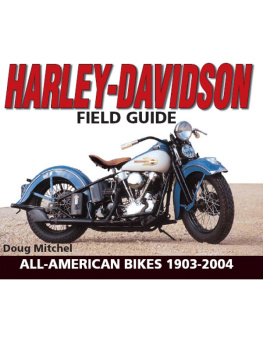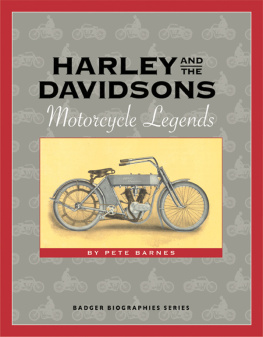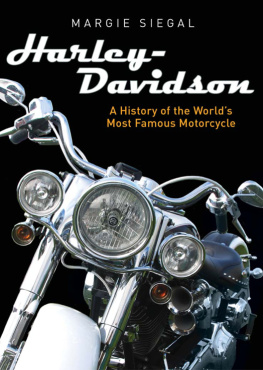Harley-Davidson and Philosophy
Popular Culture and Philosophy
Harley-Davidson and
Philosophy
Full-Throttle Aristotle
Edited by
BERNARD E. ROLLIN, CAROLYN M. GRAY,
KERRI MOMMER, and CYNTHIA PINEO

OPEN COURT
Chicago and La Salle, Illinois
Volume 18 in the series, Popular Culture and Philosophy
To order books from Open Court, call 1-800-815-2280, or visit
www.opencourtbooks.com.
Open Court Publishing Company is a division of Carus Publishing Company.
Copyright 2006 by Carus Publishing Company
First printing 2006
All rights reserved. No part of this publication may be reproduced, stored in a retrieval system, or transmitted, in any form or by any means, electronic, mechanical, photocopying, recording, or otherwise, without the prior written permission of the publisher, Open Court Publishing Company, a division of Carus Publishing Company, 315 Fifth Street, P.O. Box 300, Peru, Illinois, 61354.-3000.
This book is not an official Harley-Davidson publication and is in no way prepared, authorized, sponsored, or endorsed by the Harley-Davidson company Harley-Davidson is a registered trademark of H-D Michigan, Inc. Some of the words and model designations referenced herein are also the property of their respective trademark owners. They are used for identification purposes only.
Chapter 13 is copyright 2004 Gary L. Kieffner.
Library of Congress Cataloging-in-Publication Data
Hip hop and philosophy: rhyme 2 reason / edited by Derrick Darby and Tommie Shelby.
p. cm. (Popular culture and philosophy; v. 16)
Includes bibliographical references and index.
ISBN-13: 978-0-8126-9807-7
1. Rap (Music)Social aspects. 2. Music and philosophy.
3. Hip-hop. I. Darby, Derrick, 1967- II. Shelby, Tommie, 1967- III. Series.
ML3918.R37H55 2005
782.421649'01dc22
2005019833
Contents
BERNARD E. ROLLIN
GRAHAM PRIEST
RANDALL E. AUXIER
RANDALL E. AUXIER
JONATHAN GOLDSTEIN
BERNARD E. ROLLIN
ALAN R. PRATT
FRED FELDMAN
CRAIG BOURNE
GRAHAM HARMAN
BERNARD E. ROLLIN
STEVEN E. ALFORD
SUZANNE FERRISS
GARY L. KIEFFNER
DAVID JONES
BERNARD E. ROLLIN
Some years ago, my son and I took a two-week motorcycle trip to Wyoming and Montana and stopped at Yellowstone. Before we left the park we, in good tourist fashion, went to watch Old Faithful erupt. We just missed it, but were assured it would go again in twenty-five minutes or so. As the twenty-five minutes became closer to an hour, we struck up a conversation with an outlaw biker from L.A. We had a marvelous conversation; he was both a well-informed and a witty conversationalist. But a shadow hung over the discussion, rooted in my fear that he would ask me what I was thinking of as the Dreaded Question, namely, What do you do for a living? Had Old Faithful been truer to its name, I might have avoided the Dreaded Question; but it was not.
About five minutes prior to eruption, he did indeed turn to me and asked, Say, what do you do for a living? I briefly contemplated a variety of plausible falsehoods I could fakeI am a welder... a cowboy... a construction worker. But I was raised to tell the truth, and anyway figured his response to the truth would probably make for a good story. Steeling myself, I squeaked, Actually, Im a philosophy professor. At this point, he leaped off his bike, embraced me enthusiastically and intoned, Gee thats great! You have a steady job so you can keep the bike running!
I have told that story many times since then, much to the amusement of my audiences. But the story contains a number of points directly relevant to the subject matter of this book, the Harley-Davidson way of life, that are worth discussing.
In the first place, the easy camaraderie that our conversation evidenced is typical of what occurs when Harley riders of all backgrounds meet under any circumstance. There is an instant bonding that can be found among fraternity brothers, Shriners, and former New Yorkers. Some of it is, of course, very simply the brotherhood of people evidenced in those who share a common interest. But there is something extra among Harley Riders that is elusive to characterize, but exists nonetheless. It is not only a sense of shared pursuit, but also a kind of quiet elitism stemming from absolute certainty that one is privy to something that most people will neither experience nor understand. I hope the essays in this book will help explain this je ne sais quoi.
Second, the story evidences the fact that the biker automatically assumed that everythingeven ones professionrevolves around and is ancillary to ones time on the motorcycle. Whether the biker is a professor, an outlaw, a surgeon, a lawyer, or a plumber, the motorcycle is never far from the center of ones consciousness. On one occasion, I went for a ride with a friend who was not an experienced rider; she promptly crashed the motorcycle on a rural road, cracking three ribs and breaking her clavicle. Fortunately, we were not far from Laramie, Wyoming, and what is arguably the nicest hospital either of us had ever been in. Within thirty minutes we were in the emergency room, and a trauma surgeon was examining her. After finishing his examination and telling me the damage, he looked me in the eye and said, God damn you and your friend! If it werent for the two of you I would be out riding my Harley on this fine summer day. That anecdote tells it all.
In this book, we have attempted to collect a variety of philosophical reflections on the unique phenomenon of Harleys and their riders. If some of our readers choose to explore riding a Harley further, my time will have been well spent.
GRAHAM PRIEST
Transcend discrimination of opposites, discover total reality, and achieve detachment. This is complete freedom.
D gen (Shobogenzo, )
gen (Shobogenzo, )
Pirsigs Paradoxical Book
Motorcycles and Zen dont seem very natural bedfellows. When we think of Zen, we normally think of a monk seated peacefully in meditation in the tranquility of a temple or a garden. If theres any noise at all, its the ringing of a temple bell or the chirping of birds or cicadas. By contrast, motor bikes are noisy, exciting, dangerousalmost the exact opposite. To try to put the two things together would seem to be paradoxical in the extreme.








 gen (Shobogenzo, )
gen (Shobogenzo, )